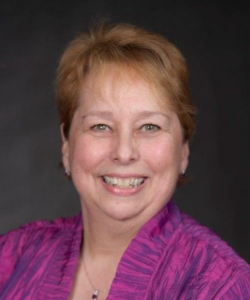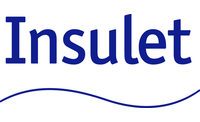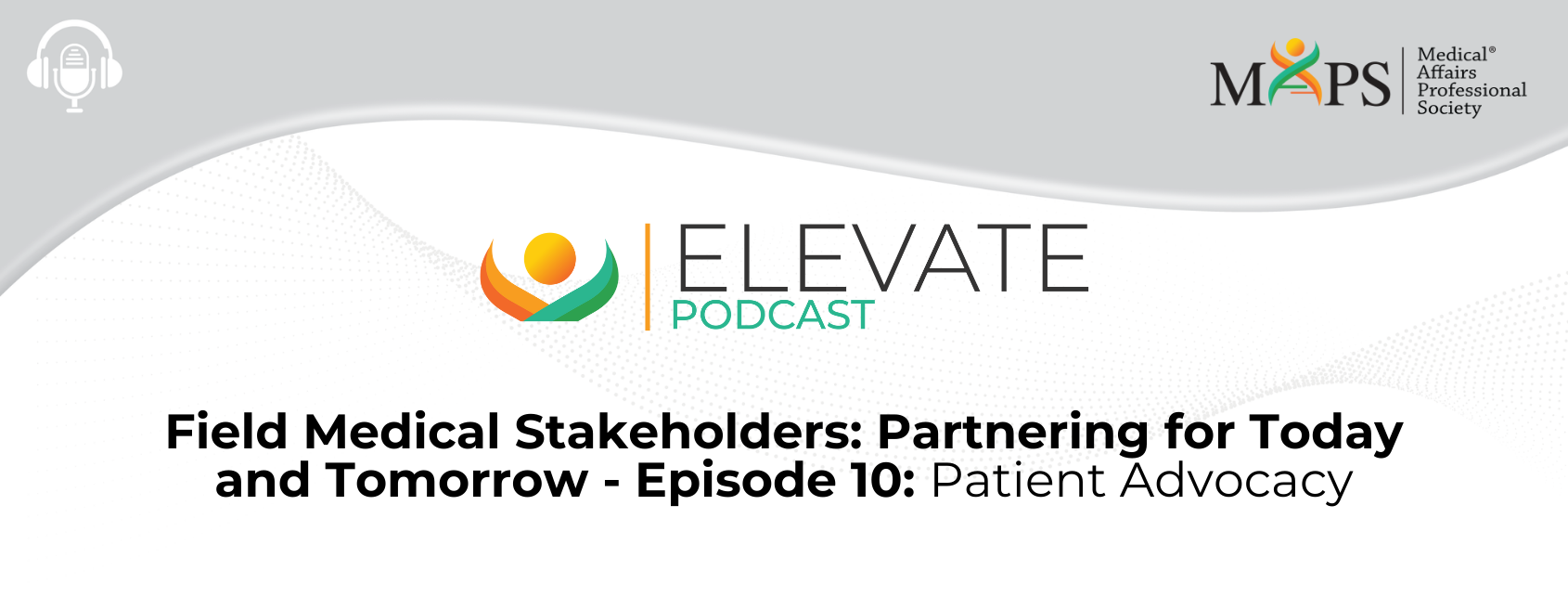Objectives
At the end of this series of podcasts, the participant should be able to:
-
Discuss the functions and activities of key internal partners
-
Identify potential areas for compliant collaboration by MSLs with key internal partners

MODERATOR: Kathryn Gann

INTERVIEWER: Eleonora Goldberg


INTERVIEWEE: Alissa Heizler-Mendoza

Following is an automated transcription provided by otter.ai. Please excuse inaccuracies.
Kathryn Gann 0:00
Welcome to the medical affairs professional society field medical focus area working groups podcast series, entitled field medical stakeholders Partnering for today and tomorrow. In this 10th podcast, we will be discussing patient advocacy. I’m Katherine Gan. I’m a member of the maps field medical focus area working group, and I’ll be the moderator for this podcast.
Kathryn Gann 0:24
I’m an independent consultant in medical affairs, having spent my 30 year career as an MSL and MSL manager and an MSL trainer. Our legal disclaimer is as follows. The views expressed in this recording are those of the individuals and do not necessarily reflect on the opinions of maps, or the companies with which they are affiliated. This presentation is for informational purposes only, and is not intended as legal or regulatory advice. We encourage you to engage in conversations about partnering with field medical stakeholders with other maps members via the community portal on the maps website. Simply log in with the email address and password associated with your maps account and click on the discussion tab. Then scroll down to field medical to post a question or two review previous postings. The objectives for this series of podcasts are that at the end of this series, the participant will be able to one discuss the functions and activities of key internal stakeholders and to identify potential areas for compliant collaboration by MSL with key internal stakeholders. I’d like to thank today’s panelists for sharing their subject matter expertise with the maps membership. speaking today are Eleanor Goldberg director global field medical capabilities at Amgen. Eleanor will be our interviewer, and Alyssa Heisler Mendoza, Senior Director of advocacy and government affairs at Insulet. And Alyssa is our interviewee. Eleanor, let me kick let me turn this over to you. So you can kick it off by briefly providing us a little bit about yourself. And then you can move into interviewing Alissa, please.
Eleonora Goldberg 2:09
That sounds great. Thank you, Katherine. Hi, everyone. My name is Eleanor Goldberg, and I am the director of field medical capabilities. Thank you so much for having me, I’d like to give you a short introduction of what I do from a field medical capabilities standpoint. I think the key point here is that with themselves around the world, we want to make sure that we have a standardized approach. And that we are supporting them at the very, very highest level so that they can have the biggest impact with their external stakeholders. And we do that through identifying opportunities to develop them developing, for example, global competency models, as well as recognizing the talent through global field medical awards program, for example. We also work very closely with the analytics component. Not only do we care about the quantitative, but also the qualitative, but it all starts with that quantitative piece. So doing a lot of analytics on what’s the engagement that we’re seeing around the world. And it’s really interesting and really grateful for my role. I have been in the industry about 20 years, and have was an MSL for about seven years before moving in health. So with that, I’d like to hand it over to Alyssa if you can give us a brief introduction as well. That would be great.
Alissa Heizler-Mendoza 3:28
Thank you, Eleanor. Hello, everyone. I’m very excited to be here today. Most often because I was an MSL for 10 years. And now I am in patient advocacy. I’m also a CDE and diabetes educator by trade and I’ve been in the diabetes field for about 25 years and an industry for about eight teen. And I wanted to talk to you a little bit about advocacy and my role within the organization. I work for a company called Insulet. And Insulet is located in Acton, Massachusetts. And it is dedicated to helping people with diabetes. And we have a tubeless insulin delivery system. And in the future, we’ll have an artificial pancreas or automated insulin delivery system. So that’s really exciting, that we’re bringing innovation to people with diabetes, specifically an ad Because see, what we do is one stakeholder advocacy. And that is really looking at the ecosystem and the communities surrounding us and building trust and credibility as an organization. So for my company and solet it’s really building trust and credibility within the diabetes community. And the diabetes community consists of many nonprofits, like jdrf and beyond type one and then professional organizations like the American Association of clinical endocrinologists. So we we build trust and credibility within these organisms. patients and then we look for mutual beneficial partnerships, not transactional type of relationships, but more collaborative types of relationships. So partnership that will move our dual missions forward and our business forward, but also really meet the unmet needs of someone with diabetes. We also generate insights for the organization, we work extremely cross functionally. So working from r&d, throughout commercialization, we work with our human factors team to make sure that the diabetes community has input in terms of what our devices are like and what features they need very early on. And then we work through marketing and commercialization to increase awareness of insulin pumps usage for people with diabetes, so extremely cross functional in nature. The other piece we do is policy advocacy, I’m not going to touch too much on that. But a lot of our focuses on accelerating access, and I would say affordable access for people with diabetes related to innovation. A lot of the pathways that exist from a policy perspective, do not necessarily have innovation in mind, they had no idea that the innovation would exist. So a lot of it is developing new pathways for innovation so people can utilize the devices and affordable access to them.
Eleonora Goldberg 6:22
Wow, that’s great. You’re really making an impact that’s at the patient level. I’m curious if you can give us an example of how, how this rule fits in within the larger organization that you work at for how it’s structured and how you interact. You mentioned you interact, cross functionally, how you interact with those different internal colleagues of yours?
Alissa Heizler-Mendoza 6:43
That’s a great question. If you look at advocacy, across therapeutic areas, and across pharma and med device, you’re going to find that it sits in very different areas. In the past where I worked, when I started in patient advocacy, we were in external affairs. And we were in external affairs because it was somewhat of a Switzerland, we were very neutral. And we didn’t have to worry about firewalls that might exist between commercial and medical. So we were able to work cross functionally within a big pharma environment. In my current company, we’re kind of an innovative growing company, we started very small, so we multitask at a lot of roles. And I sit in the market access team, which is a really interesting place to sit. And we do so again, because we really focus on on access, which is really key. And if you would ask the community and I’m, again, I’m talking to diabetes community, but most patient communities, what their major concerns are, it’ll be affordable access. So it does make sense to sit and market access, we’re we’re working with the National account managers, and our, our pharmacy channel to really make sure we understand the business and the nuances associated with access. So we can advocate appropriately and again, pave the way for innovation moving forward. We also work really closely with marketing, again, from an awareness and generation of insights. So the communications that we develop, we kind of run them by the diabetes community to make sure that we’re speaking their language, and we’re identifying with them, you know, developing things in a bubble without the community input, you might not develop something that is best for people. And so we really get that user generated insight into everything that we do. And then like I said, marketing, medical, we’re MSL fit. So from a medical standpoint, when we’re working with professional organizations, it’s very important and me having that background and that MSL lens really builds credibility for myself within the professional arena. So that background is is really really helpful. Other ways we currently work with this person is Coalition’s So for example, if we’re trying to get something in guidelines moving forward, we want to have a seat at the table with the coalition and determine what the what the environment is going to look like and what the objectives are. So having a medical person along with myself is extremely helpful, related to policy change and clinical guidelines. And I’ll use the example of time and range and diabetes. So right now a lot of the guidelines are around hemoglobin a one C, and the community is really working to gather evidence related to time and range. Because that is so important for someone with diabetes, especially now with CGM. So I work closely with medical to make sure we have a voice. And we have a seat at the table related to the development of policy change and guidelines.
Eleonora Goldberg 9:59
Yeah That’s great, thank you. So really interesting career path and where you’re ending up in where you are now as a small company in the marketing department, or market access department, I should say, curious to hear about how the how you ended up from an MSL to where you are now I think that’s really interesting. And you even mentioned that having that MSL experience is really helping you guide how you go, how you even work with the MSL team that you’re hiring now. So if you can give us a little bit of that, that career path that you had and how that’s helping you today.
Alissa Heizler-Mendoza 10:37
And so I started out as a clinician, which gives you that fantastic foundation that I’ve utilized throughout my career. So as an RD CDE, I worked with the diabetes team for years, and then I transferred to industry and was an MSL for a company called Amylin, which was really an exciting time, it was a fantastic team, we launched to first in class compounds, we introduce the community to other hormones out other than insulin, to really, really wonderful time. I’ve loved being an MSL, I covered the entire northeast at one time, and Amylin was going to be acquired. So I started looking elsewhere. And I transitioned to an internal role doing caol strategy at a big pharma company. And that was really interesting, because it was a first time I was ever really exposed to the internal environment and all the cross functional teams. And one day, it was really interesting, that VP of Marketing came up to me and said, You know, there’s a patient advocacy position open, and you know, you’re all about the patient, you’re the one that’s always reminding us, the why behind what we do, you know, which is that that person with diabetes, and I think you’d be really good at developing the role. So I put some thought into it. And and, you know, I did it, and I started the working in patient advocacy and really liked it.
Eleonora Goldberg 12:06
Wow, that’s great. I think one of the key things or key takeaways I have from your story is that you have to be open to opportunities, that wasn’t necessarily something you thought out, but someone approached you and you took it and ran with it. And you’re very happy to where you are today. So I think that’s a key component for all of us in our career development is to take those opportunities as they come even if it’s not something you may have planned out, I have one final question for you for the msls out there that are listening, if they want to get more involved with access, and with patients, any suggestions you may have for them on how they go about doing that either within their role or in some other capacity.
Alissa Heizler-Mendoza 12:48
So a couple of things come to mind. One is, as you’re engaging with your Kalos, there’s a lot of cables now that are getting involved in policy issues and advocating for their patients. I actually wrote an article on HCP and advocacy to one, encourage hcps to advocate for their patients at an individual level, but also at a systemic level. So that’s something that, you know, they can become more familiar with when they’re having their discussions with caol. You know, if they’re involved in policy development, or advocating for their patients. The second thing is, is really getting to learn the community. So I knew my k well, community, but I had no idea that outside of like jdrf, that these patient groups exists. And they are the ones that drive change in policy and legislation. And their voice is really loud. So getting to know them, you know, whether it be mapping out the ecosystem, what patient groups you’re involved with in the press professional organizations is a great way to do it. Now, what are the hot topics that people are advocating for? And how can you become more familiar with it? And how could you work it into your discussions with your kll? So I think those are those are two ways. And then the third is if you have a patient advocacy function within your organization, may be asked, you know, how can we partner, you know, can I sit in in one of their professional organization, industry boards, I think that’s a great way to become more familiar with what the needs of their professional community are and get to know kind of the workings of your organization moving forward. So I think those are three ways you can get to know or engage, you know, in the patient advocacy role moving forward.
Eleonora Goldberg 14:41
Wow, that’s great. Thank you so much for the advice. Okay, well, I think that wraps up this session. I’ll hand it over, back over to Katherine.
Alissa Heizler-Mendoza 14:49
Thank you so much.
Kathryn Gann 14:52
So I want to thank Eleanor and Alyssa both for participating and quite truthfully, it was interesting to me elicited here You talk about where patient advocacy sits and it can sit in lots of different places, which I don’t think as an MSL I ever really thought about. And also that you’re doing really cross functional work with key internal stakeholders and using your MSL skills and also relying on MSL for insight. And we hear that a lot in these podcasts that that’s a great value that MSL spring are those insights. So I want to thank you for sharing all of that with us. And so I’m hoping that now our participants have a better understanding of the role and function of patient advocacy, and how they is msls may compliantly interact with this group. This has been the 10th podcast in a series on the topic of field medical stakeholders Partnering for today and tomorrow. If you’re a maps member, thank you for your support of maps. If you’re not yet a maps member and would like access to additional resources in this area, please visit the maps website to explore joining and that is medical affairs.org forward slash membership. This concludes the podcast



